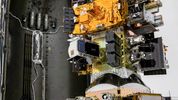As industries worldwide grapple with rapid technological disruption, shifting economic conditions, and growing energy demands, satellite navigation is emerging as one of the most critical enablers of efficiency, security, and sustainability. Once seen primarily as a tool for personal navigation, GPS has evolved into a foundational technology underpinning the global economy, essential to everything from financial markets and power grids to autonomous transportation and AI-driven industries.
This transformation was at the heart of our recent Generation Space podcast discussion, featuring Brian Manning, CEO of Xona Space Systems, and Lewis Jones, Investment VP at Generation Space. The conversation highlighted how GPS innovation is increasingly driven by private sector investment, why industries are more dependent on positioning data than ever before, and how satellite navigation is playing a surprising role in sustainability efforts.
Manning describes GPS as one of the most underestimated forces shaping the modern world. While most people think of it as simply the “blue dot” on their smartphones, he argues that GPS is now a critical infrastructure supporting countless industries. It ensures that global supply chains function efficiently, coordinates financial transactions across international markets, stabilises power grids, and enables emergency response teams to react in real time to natural disasters. As Manning puts it, “If you were to wake up from a coma after 30 years, the first two questions you’d ask are: Where am I? And what time is it? That’s exactly what GPS answers—every second of every day, for industries worldwide.”
The scalability and affordability of GPS make it indispensable. Unlike cellular or Wi-Fi-based positioning systems, GPS provides a uniform service across the entire planet without the need for expensive local infrastructure. This has made it the de facto standard for global navigation, with industries increasingly turning to high-precision satellite positioning to optimise efficiency. As AI and automation continue to reshape industries, the need for ultra-precise, real-time location intelligence is becoming more critical.
Furthermore, AI-driven industries are accelerating the demand for GPS-powered insights. In logistics and supply chains, real-time location data enables businesses to track and optimise fleet movement, reducing emissions and costs. In autonomous transportation, self-driving cars and drones rely on centimetre-level accuracy for safe and efficient operation. Even industries like finance and telecommunications depend on GPS timing synchronisation, ensuring secure transactions and stable network operations. “AI is pushing industries toward smarter, data-driven decision-making,” Jones explains. “The better your location data, the better your insights—and that’s exactly where next-generation GPS comes in.”
With the global economy becoming increasingly location-dependent, private space companies are racing to enhance GPS accuracy, security, and reliability. Xona Space Systems, for example, is developing next-generation satellite navigation networks designed to offer higher precision, greater resilience against interference, and better coverage in urban environments. This is particularly relevant as governments and businesses seek alternatives to existing GPS infrastructure, ensuring continuity in the face of cybersecurity threats and geopolitical risks.
Beyond optimising business operations, GPS is also a key enabler of sustainability efforts. With global electricity demand from AI expected to more than double by 2026, industries are searching for ways to reduce energy consumption and improve efficiency. Surprisingly, GPS and satellite navigation are playing a crucial role in this transition. Satellite-enabled IoT sensors are now being used to monitor energy infrastructure, track environmental changes, and optimise renewable energy generation.
Manning points out that GPS is helping address climate challenges in ways that often go unnoticed. Satellite imagery and positioning data are being used to determine optimal locations for solar farms and wind turbines, ensuring they capture the maximum amount of energy. AI-driven logistics platforms use GPS to reduce unnecessary transport emissions, making global supply chains more sustainable. Even disaster response teams now rely on GPS to monitor flood patterns, track wildfire spread, and coordinate relief efforts in real time. As industries evolve, space-based navigation will become an even greater force for economic growth and environmental protection.
Investment in GPS technology is surging, with venture capital and institutional investors recognising its potential as a core infrastructure for the AI-driven economy. Lewis Jones notes that the intersection of AI, automation, and geospatial intelligence is creating opportunities for both startups and established players. “We’re seeing an explosion of interest in positioning technologies, from logistics giants to AI-driven enterprises,” he explains. “The next decade of automation will be built on the foundation of precise location data, and investors know that.”
Looking ahead, the evolution of GPS will be defined by advancements in precision, security, and scalability. Private companies are developing resilient, next-generation positioning networks that enhance accuracy down to the centimetre level, making them essential for industries like precision agriculture, autonomous transport, and industrial automation. Meanwhile, integrating AI-driven analytics will enable businesses to extract even more value from location-based data, leading to smarter decision-making and greater operational efficiencies.
Manning is confident that GPS innovation will only accelerate in the coming years, shaping the intelligent, automated industries of the future. “The world’s demand for precise positioning and timing will only grow,” he says. “The question isn’t whether GPS will evolve—it’s how fast we can innovate to keep up.”
As industries navigate the challenges of technological disruption, sustainability, and automation, one thing is clear: GPS will be one of the most valuable assets of the intelligent age.
Check out the podcast episode here: https://seraphim.vc/generation-space/podcast/industry-for-the-intelligent-age-with-brian-manning-co-founder-ceo-xona-and-generation-space-investment-vp-lewis-jones/
 unknownx500
unknownx500











